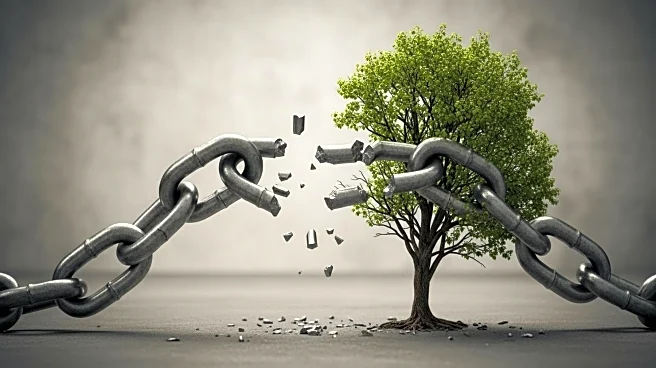What is the story about?
What's Happening?
A recent study conducted by Prof. Keren Dopelt from Ashkelon Academic College has highlighted the psychological effects of social media use during the ongoing Israel-Hamas conflict. The research surveyed 304 adults between February and May 2025, revealing a significant association between heavy social media use and increased anxiety, as well as lower perceptions of national resilience among Israelis. The study found that platforms like WhatsApp, Instagram, and Facebook were heavily used for war-related updates, with many participants increasing their daily news consumption by over two hours since the conflict began. The findings showed an average anxiety score of 3.3 out of 5 among respondents, with two-thirds experiencing moderate to high psychological distress. Additionally, the study noted that increased digital exposure undermined perceptions of national resilience, with an average resilience score of 3.45 out of 5.
Why It's Important?
The study underscores the dual role of social media as both a source of information and a contributor to emotional distress during conflicts. The findings suggest that while social media provides rapid updates and a sense of solidarity, it also amplifies anxiety and diminishes trust in institutions due to its emotionally charged and unfiltered content. This has broader implications for public health and policy, as it highlights the need for media literacy programs and healthier news consumption patterns. The study also points to significant gender disparities, with women reporting higher anxiety levels and lower resilience, emphasizing the need for gender-sensitive mental health strategies. Understanding the psychological impact of social media is crucial for developing effective resilience-building measures in times of crisis.
What's Next?
Policymakers and public health officials are encouraged to balance the benefits of digital connectivity with its psychological risks. Recommendations from the study include developing media literacy programs to help citizens critically navigate online content and encouraging healthier patterns of news consumption. Mental health professionals are urged to address the role of media exposure in treatment strategies, helping individuals regulate their engagement during crises. As conflicts continue to unfold in the digital age, understanding the dual impact of social media will be essential for strengthening collective resilience while mitigating psychological harm.
Beyond the Headlines
The study highlights the paradox of social media in wartime, serving as both a lifeline for information and a source of emotional contagion. This dual impact raises ethical considerations about the responsibility of social media platforms in moderating content and the role of governments in providing clear, measured communication. The findings also suggest a need for long-term strategies to enhance digital literacy and resilience, particularly among vulnerable groups such as women, who may face disproportionate psychological strain during crises.















